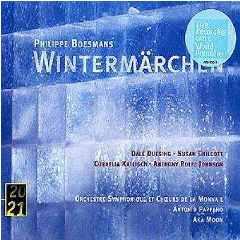Philippe Boesmans - Wintermärchen (La Monnaie 1999)
Philippe Boesmans - Wintermärchen (La Monnaie 1999)

Philippe Boesmans - Wintermarchen (La Monnaie 1999) Dale Duesing (Leontes, König von Sizilien), Susan Chilcott (Hermione), Anthony Rolfe Johnson (Polixenes, König von Böhmen), Franz-Joseph Selig (Camillo/ Stimme des Orakels), Cornelia Kallisch (Paulina, Hermiones Dienerin), Heinz Zednik (Green/ Die Zeit), Juha Kotilainen (Antigonus), Kris Dane (Florizel), Johanne Saunier (Perdita, Tochter von Leontes und Hermione), Arthur Debski (Mamillius), Ismini Giannakis, Laurence Misonne, Djamilia Kamal Babaeva (Drei Hofdamen), Lorenzo Carola, Jacques Does (Zwei Hofherren), Lorenzo Carola, Juha Kotilainen (Taschendiebe), Laurence Misonne, Djamilia Kamal Babaeva (Zwei Böhmische Mädchen), Gerard Lavalle (Ein Böhmischer Soldat) Aka Moon (Fabrizio Cassol, sax; Stéphane Galland, drums; Michel Hatzigeorgiou, bass),
Orchestre Symphonique et Choeurs de la Monnaie, Antonio Pappano (music direction)
Belgian born in 1936, the name of Philippe Boesmans will be new to many British listeners although his previous stage work, Reigen, met with considerable acclaim following its Brussels premiere in 1993, subsequently being staged in France, Germany and Austria. Credit is therefore due to Deutsche Grammophon for showing the enterprise (not without risk) of putting Boesmans’ latest opera before a wider public, enterprise which it is to be hoped pays off for the work offers much to discover.
This live recording of the world premiere took place at the Théâtre Royal de la Monnaie, Brussels on the 10th December 1999. Antonio Pappano has a fine cast under his direction and with a few relatively minor reservations they perform with impressive success. My initial doubts were concentrated around the libretto. Shakespeare’s dark tale of insane jealousy and ultimate reconciliation presents a major challenge to the librettists although Luc Bondy and Marie-Louise Bischofberger cleverly overcome this, largely through the part of Green (alias time) whose interventional commentary serves as the structurally binding thread running through the entire work (as does the theme heard in the opening bars on the accordion which Green plays as he stands outside the palace of Leontes in Sicily).
Act One deals with the onset of Leontes’ pathological jealousy, the result of his childhood friend Polixenes, the King of Bohemia, accepting the request of Leontes’ wife Hermione to stay on at the royal palace in Sicily following his initial refusal to Leontes himself. There is some fine atmosphere building here (track two) as the first doubts of his wife’s fidelity enter Leontes’ mind. As Leontes’ jealousy transforms into insanity the tension is skilfully intensified by Boesmans with a duet between Leontes and his servant Camillo as Leontes issues the order for Polixenes to be murdered. Act two sees the birth of Hermione’s daughter whom Leontes banishes to foreign shores. The subsequent trial of Hermione for treason, conspiracy and adultery is one of the undoubted highlights of the opera, as in the face of the death of his wife and son, Leontes realises the horror of what he has done. Dale Duesing is superb in the concluding bars of the act as Leontes mourns his loss.
Act three is marked by two significant changes in compositional tack. In scene four (track three) the language changes from German to English and Boesmans introduces AKA Moon, a jazz/funk combo whose brand of improvisatory fusion sounds strangely ill at ease and ultimately rather dated. This change to a kind of vernacular colloquialism is admirable in principle, designed as it is, to reflect the change of location to the “Bohemian coast” and the underworld existence of Florizel, the long lost son of Polixenes who has resorted to a life of pick-pocketing and petty crime. In reality I found it to unsettle the whole balance of the act. Fortunately however, it does not last for long and I was glad when Boesmans returned to his accustomed musical language in track six. The culmination of the work in Act four is well handled as Hermione is revealed imprisoned in a block of ice and emerges, the ice thawing and shattering around her, to the remorse of Leontes and his uneasiness that his insanity may return.
Boesmans’ language is by turns kaleidoscopically colourful and lyrical. His orchestration is finely detailed, the sometimes eclectic melodic and harmonic characteristics of his music accessible yet challenging. Many listeners will recognise the many fleeting references to Richard Strauss, Mozart and Berg which he readily uses (often not a direct quote but an unmistakable shadow). Certainly he has distanced himself from the avant-garde and there is little in this work which anyone with doubts as to the extent of their musical adventurousness need fear. Anyone who has enjoyed the operas of Britten for instance, is likely to feel at home with Boesmans’ sound world.
Given the limitations of the pit acoustic the sound is impressively vivid and Antonio Pappano conducts with the tautness that we have come to expect from him. The cast is on exceptional form and sing to the highest standard throughout although Dale Duesing, Susan Chilcott and Heinz Zednik are worthy of particular mention.
As with all of Deutsche Grammophon’s releases in their 20/21 series the packaging is beautifully put together and the booklet is highly comprehensive, complementing the libretto and synopsis with an interesting interview with the composer and an introductory essay by Alain Perroux. It completes a fine release that will give many opera lovers a good deal of pleasure. ---Christopher Thomas, musicweb-international.com
download (mp3 @320 kbs):
yandex 4shared mega mediafire zalivalka cloudmailru oboom uplea
Zmieniony (Czwartek, 28 Styczeń 2016 13:36)








